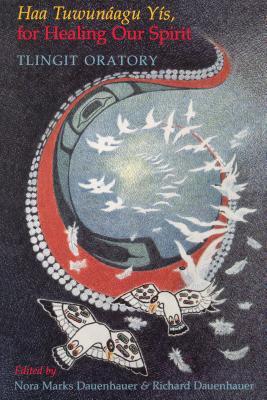Haa Tuwunaagu Yis, for Healing Our Spirit is the first publication of Tlingit oratory recorded in performance. It features Tlingit texts with facing English translations and detailed annotations; photographs of the orators and the settings in which the speeches were delivered; and biographies of the elders. There are thirty-two speeches by twenty-one Tlingit elders. Most were taped between 1968 and 1988, but two speeches were recorded on wax cylinders by the Harriman Expedition in Sitka in 1899, and are the oldest known sound recordings of Tlingit.
The book is of importance both to native and non-native readers alike. For those of Native American heritage it articulates concepts understood and practiced by elders but difficult for them to explain, and often bewildering to younger generations. For people around the world interested in Northwest Coast culture, it offers new insights into a traditional world view and the classics of Tlingit oral literature.
Careful attention is given to transcription, translation, and annotation by the collaboration of Nora Marks Dauenhauer, a native speaker of Tlingit and a published poet, with a degree in anthropology, and her husband Richard Dauenhauer, a translator of European poetry and a former poet laureate of Alaska, with a Ph. D. in comparative literature.

Haa Tuwunagu Ys, for Healing Our Spirit: Tlingit Oratory
Haa Tuwunaagu Yis, for Healing Our Spirit is the first publication of Tlingit oratory recorded in performance. It features Tlingit texts with facing English translations and detailed annotations; photographs of the orators and the settings in which the speeches were delivered; and biographies of the elders. There are thirty-two speeches by twenty-one Tlingit elders. Most were taped between 1968 and 1988, but two speeches were recorded on wax cylinders by the Harriman Expedition in Sitka in 1899, and are the oldest known sound recordings of Tlingit.
The book is of importance both to native and non-native readers alike. For those of Native American heritage it articulates concepts understood and practiced by elders but difficult for them to explain, and often bewildering to younger generations. For people around the world interested in Northwest Coast culture, it offers new insights into a traditional world view and the classics of Tlingit oral literature.
Careful attention is given to transcription, translation, and annotation by the collaboration of Nora Marks Dauenhauer, a native speaker of Tlingit and a published poet, with a degree in anthropology, and her husband Richard Dauenhauer, a translator of European poetry and a former poet laureate of Alaska, with a Ph. D. in comparative literature.